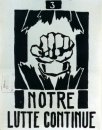
In May 1968 France experienced a political and social upheaval that shook the regime to its foundations. Student unrest in the late 60's was a world-wide phenomenon, fuelled by American protests against U.S. involvement in Vietnam and by sympathy for Latin American revolutionaries such as Fidel Castro and Che Guevarra. In France, the 'baby boom' resulted in a student population in the 1960's 10 times larger than that on the eve of the Second World War. The children of the bourgeoisie wanted an education that would guarantee them employment. French students also had grounds for complaint in the overcrowded classes in which they were taught, the lack of access to teachers, and the inflexible, centralized, bureaucratic university administration. Failure rates were high, with only 30 per cent graduating in the Arts and Law faculties. The Rector of the Sorbonne, fearing violent confrontations between left-wing and right-wing students, suspended classes, and called in the police to prevent disorder. That was a fatal decision. When the police arrested demonstrators they were attacked by other students and responded with brutality, flailing their batons and using tear gas liberally. This incident quickly developed into a major confrontation: barricades went up; street fighting broke out; the Sorbonne was occupied by students and converted into a huge commune. The unrest spread to other universities and then to the factories; a wave of strikes rolled across France, involving ten million workers and paralysing the nation. |





